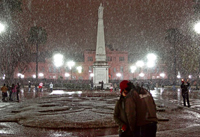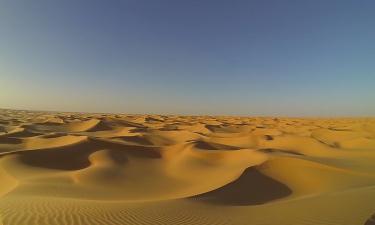Unusual cold weather strains Argentina’s energy grid
Temperatures ranging from zero degrees celsius – including first snowfall in 89 years- in Buenos Aires to –20 Celsius in the Patagonia region has exacerbated the energy shortage in the country.

Argentina faces an unusual cold winter this year, with temperatures far below zero degrees Celsius in most of its territory, including the first snowfall in the Capital Buenos Aires since 1918. The extreme temperatures, which have often reached –20 degrees Celsius in the southern Patagonia region has forced the government to reduce and even cut electricity and natural gas supplies to businesses.
President Kirchner refuses to mention the word “crisis”, but lack of energy has led to the interruption of work in almost all Argentinean factories, highly dependant on gas supplying. Dry weather in the South of the country has interrupted the generation of electricity in many hydro-electric power plants located there.
To ensure sufficient residential energy, President Nestor Kirchner has in the past month asked 4,000 companies to curtail electricity use and applied gas restrictions to about 900 businesses. As presidential elections are scheduled for October this year, Kirchner has rejected plans to cut supplying to living houses.
However, as shortage can be felt in some provinces, the fluid of gas and electricity has been guaranteed to Buenos Aires and its outskirts, which concentrate almost 40% of the population. At the same time, textile industry in the north of the country has halted its operations, suspending workers.
There, locals enjoyed the first snowfall in 89 years on Monday during the celebrations of the national independence day. First snowflakes begun falling at 3 pm, and turned into a heavy snowfall in the evening. Residents celebrated the unusual spectacle gathering in city squares, which gradually turned white.
While Argentina has cut gas supplying to Chile exporting to there its energy crisis, Brazil and Bolivia committed to increase the supplying of electricity and gas, respectively to ease the situation of their southern neighbor. Natural gas consumption jumps in the winter as Argentines use the price-controlled fuel to heat homes, while demand for electricity also rises, boosting the need for gas from power generators.
Argentina's demand for electricity has soared with four years of economic growth above 8 percent. However, little investment has been made to increase generation as price of fuel is being regulated by the state.
Kirchner blames utility companies for failing to make new investments in exploration and production. Demand for electric power rose 6.3 percent in the first quarter, compared with a 4.4 percent increase in supply, according to Investigaciones Economicas Sectoriales, a Buenos Aires economic-research company.
As winter fell over Argentina, lack of power became evident. On May 30, temperature in Buenos Aires dropped to zero Celsius and the government ordered to cut supplying of Comprised Natural Gas, mostly used by taxis to fuel their cars. Authorities also demanded gas supplying companies to interrupt supplying to businesses sparking angry protests of industrials. Similar temperatures led to similar decisions this week.
Weather forecast foresees more days of unusual cold weather for Argentina this winter. According to records, temperatures begin to rise during the third week of August. As residents of Buenos Aires anxiously wait for new snowfalls, authorities pray for better weather conditions that could ease the current critical situation of the energy grid.
Hernan Etchaleco
Subscribe to Pravda.Ru Telegram channel, Facebook, RSS!



